Header file for circuitbuild.c. More...
#include "handles.h"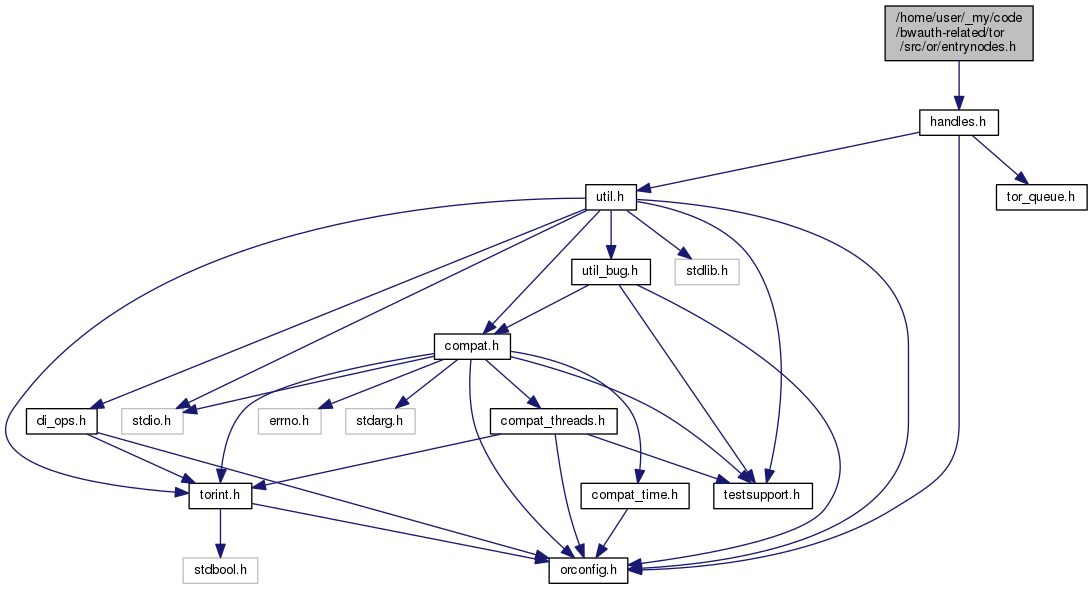

Go to the source code of this file.
Data Structures | |
| struct | guard_pathbias_t |
| struct | guardfraction_bandwidth_t |
Macros | |
| #define | circuit_guard_state_free(val) FREE_AND_NULL(circuit_guard_state_t, circuit_guard_state_free_, (val)) |
Typedefs | |
| typedef struct guard_selection_s | guard_selection_t |
| typedef struct entry_guard_t | entry_guard_t |
| typedef struct circuit_guard_state_t | circuit_guard_state_t |
| typedef struct entry_guard_restriction_t | entry_guard_restriction_t |
| typedef struct guard_pathbias_t | guard_pathbias_t |
| typedef struct guardfraction_bandwidth_t | guardfraction_bandwidth_t |
Enumerations | |
| enum | guard_usage_t { GUARD_USAGE_TRAFFIC = 0, GUARD_USAGE_DIRGUARD = 1 } |
| enum | guard_usable_t { GUARD_USABLE_NEVER = -1, GUARD_MAYBE_USABLE_LATER = 0, GUARD_USABLE_NOW = 1 } |
Functions | |
| int | guards_update_all (void) |
| const node_t * | guards_choose_guard (cpath_build_state_t *state, uint8_t purpose, circuit_guard_state_t **guard_state_out) |
| const node_t * | guards_choose_dirguard (uint8_t dir_purpose, circuit_guard_state_t **guard_state_out) |
| entry_guard_t * | entry_guard_get_by_id_digest_for_guard_selection (guard_selection_t *gs, const char *digest) |
| entry_guard_t * | entry_guard_get_by_id_digest (const char *digest) |
| circuit_guard_state_t * | get_guard_state_for_bridge_desc_fetch (const char *digest) |
| void | entry_guards_changed_for_guard_selection (guard_selection_t *gs) |
| void | entry_guards_changed (void) |
| guard_selection_t * | get_guard_selection_info (void) |
| int | num_live_entry_guards_for_guard_selection (guard_selection_t *gs, int for_directory) |
| int | num_live_entry_guards (int for_directory) |
| const node_t * | entry_guard_find_node (const entry_guard_t *guard) |
| const char * | entry_guard_get_rsa_id_digest (const entry_guard_t *guard) |
| const char * | entry_guard_describe (const entry_guard_t *guard) |
| guard_pathbias_t * | entry_guard_get_pathbias_state (entry_guard_t *guard) |
| void | circuit_guard_state_free_ (circuit_guard_state_t *state) |
| int | entry_guard_pick_for_circuit (guard_selection_t *gs, guard_usage_t usage, entry_guard_restriction_t *rst, const node_t **chosen_node_out, circuit_guard_state_t **guard_state_out) |
| guard_usable_t | entry_guard_succeeded (circuit_guard_state_t **guard_state_p) |
| void | entry_guard_failed (circuit_guard_state_t **guard_state_p) |
| void | entry_guard_cancel (circuit_guard_state_t **guard_state_p) |
| void | entry_guard_chan_failed (channel_t *chan) |
| int | entry_guards_update_all (guard_selection_t *gs) |
| int | entry_guards_upgrade_waiting_circuits (guard_selection_t *gs, const smartlist_t *all_circuits, smartlist_t *newly_complete_out) |
| int | entry_guard_state_should_expire (circuit_guard_state_t *guard_state) |
| void | entry_guards_note_internet_connectivity (guard_selection_t *gs) |
| int | update_guard_selection_choice (const or_options_t *options) |
| int | entry_guard_could_succeed (const circuit_guard_state_t *guard_state) |
| MOCK_DECL (int, num_bridges_usable,(int use_maybe_reachable)) | |
| void | remove_all_entry_guards_for_guard_selection (guard_selection_t *gs) |
| void | remove_all_entry_guards (void) |
| void | entry_guard_learned_bridge_identity (const tor_addr_port_t *addrport, const uint8_t *rsa_id_digest) |
| int | entry_list_is_constrained (const or_options_t *options) |
| int | guards_retry_optimistic (const or_options_t *options) |
| int | entry_guards_parse_state_for_guard_selection (guard_selection_t *gs, or_state_t *state, int set, char **msg) |
| int | entry_guards_parse_state (or_state_t *state, int set, char **msg) |
| void | entry_guards_update_state (or_state_t *state) |
| int | getinfo_helper_entry_guards (control_connection_t *conn, const char *question, char **answer, const char **errmsg) |
| int | entries_known_but_down (const or_options_t *options) |
| void | entries_retry_all (const or_options_t *options) |
| char * | entry_guards_get_err_str_if_dir_info_missing (int using_mds, int num_present, int num_usable) |
| char * | guard_selection_get_err_str_if_dir_info_missing (guard_selection_t *gs, int using_mds, int num_present, int num_usable) |
| void | entry_guards_free_all (void) |
| double | pathbias_get_close_success_count (entry_guard_t *guard) |
| double | pathbias_get_use_success_count (entry_guard_t *guard) |
| int | should_apply_guardfraction (const networkstatus_t *ns) |
| void | guard_get_guardfraction_bandwidth (guardfraction_bandwidth_t *guardfraction_bw, int orig_bandwidth, uint32_t guardfraction_percentage) |
Detailed Description
Header file for circuitbuild.c.
Typedef Documentation
◆ guardfraction_bandwidth_t
| typedef struct guardfraction_bandwidth_t guardfraction_bandwidth_t |
Contains the bandwidth of a relay as a guard and as a non-guard after the guardfraction has been considered.
Enumeration Type Documentation
◆ guard_usage_t
| enum guard_usage_t |
Enum to specify how we're going to use a given guard, when we're picking one for immediate use.
Function Documentation
◆ circuit_guard_state_free_()
| void circuit_guard_state_free_ | ( | circuit_guard_state_t * | state | ) |
Release all storage held in state.
◆ entry_guard_cancel()
| void entry_guard_cancel | ( | circuit_guard_state_t ** | guard_state_p | ) |
Cancel the selection of *guard_state_p without declaring success or failure. It is safe to call this function if success or failure has already been declared.
◆ entry_guard_chan_failed()
| void entry_guard_chan_failed | ( | channel_t * | chan | ) |
Run the entry_guard_failed() function on every circuit that is pending on chan.

◆ entry_guard_could_succeed()
| int entry_guard_could_succeed | ( | const circuit_guard_state_t * | guard_state | ) |
Return true iff the circuit's guard can succeed that is can be used.
◆ entry_guard_describe()
| const char* entry_guard_describe | ( | const entry_guard_t * | guard | ) |
Return a statically allocated human-readable description of guard

◆ entry_guard_failed()
| void entry_guard_failed | ( | circuit_guard_state_t ** | guard_state_p | ) |
Called by the circuit building module when a circuit has failed: informs the guards code that the guard in *guard_state_p is not working, and advances the state of the guard module.
◆ entry_guard_find_node()
| const node_t* entry_guard_find_node | ( | const entry_guard_t * | guard | ) |
Return the node_t associated with a single entry_guard_t. May return NULL if the guard is not currently in the consensus.
◆ entry_guard_get_by_id_digest()
| entry_guard_t* entry_guard_get_by_id_digest | ( | const char * | digest | ) |
If digest matches the identity of any node in the entry_guards list for the default guard selection state, return that node. Else return NULL.

◆ entry_guard_get_by_id_digest_for_guard_selection()
| entry_guard_t* entry_guard_get_by_id_digest_for_guard_selection | ( | guard_selection_t * | gs, |
| const char * | digest | ||
| ) |
If digest matches the identity of any node in the entry_guards list for the provided guard selection state, return that node. Else return NULL.

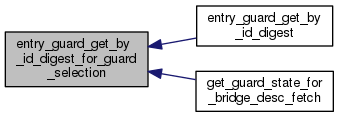
◆ entry_guard_get_pathbias_state()
| guard_pathbias_t* entry_guard_get_pathbias_state | ( | entry_guard_t * | guard | ) |
Return the pathbias state associated with guard.

◆ entry_guard_get_rsa_id_digest()
| const char* entry_guard_get_rsa_id_digest | ( | const entry_guard_t * | guard | ) |
Return guard's 20-byte RSA identity digest
◆ entry_guard_learned_bridge_identity()
| void entry_guard_learned_bridge_identity | ( | const tor_addr_port_t * | addrport, |
| const uint8_t * | rsa_id_digest | ||
| ) |
Update the guard subsystem's knowledge of the identity of the bridge at addrport. Idempotent.

◆ entry_guard_pick_for_circuit()
| int entry_guard_pick_for_circuit | ( | guard_selection_t * | gs, |
| guard_usage_t | usage, | ||
| entry_guard_restriction_t * | rst, | ||
| const node_t ** | chosen_node_out, | ||
| circuit_guard_state_t ** | guard_state_out | ||
| ) |
Pick a suitable entry guard for a circuit in, and place that guard in *chosen_node_out. Set *guard_state_out to an opaque state object that will record whether the circuit is ready to be used or not. Return 0 on success; on failure, return -1.
If a restriction is provided in rst, do not return any guards that violate it, and remember that restriction in guard_state_out for later use. (Takes ownership of the rst object.)


◆ entry_guard_state_should_expire()
| int entry_guard_state_should_expire | ( | circuit_guard_state_t * | guard_state | ) |
Return true iff the circuit whose state is guard_state should expire.


◆ entry_guard_succeeded()
| guard_usable_t entry_guard_succeeded | ( | circuit_guard_state_t ** | guard_state_p | ) |
Called by the circuit building module when a circuit has succeeded: informs the guards code that the guard in *guard_state_p is working, and advances the state of the guard module. On a GUARD_USABLE_NEVER return value, the circuit is broken and should not be used. On a GUARD_USABLE_NOW return value, the circuit is ready to use. On a GUARD_MAYBE_USABLE_LATER return value, the circuit should not be used until we find out whether preferred guards will work for us.
◆ entry_guards_changed()
| void entry_guards_changed | ( | void | ) |
Our list of entry guards has changed for the default guard selection context, or some element of one of our entry guards has changed. Write the changes to disk within the next few minutes.

◆ entry_guards_changed_for_guard_selection()
| void entry_guards_changed_for_guard_selection | ( | guard_selection_t * | gs | ) |
Our list of entry guards has changed for a particular guard selection context, or some element of one of our entry guards has changed for one. Write the changes to disk within the next few minutes.

◆ entry_guards_free_all()
| void entry_guards_free_all | ( | void | ) |
Release all storage held by the list of entry guards and related memory structs.
◆ entry_guards_get_err_str_if_dir_info_missing()
| char* entry_guards_get_err_str_if_dir_info_missing | ( | int | using_mds, |
| int | num_present, | ||
| int | num_usable | ||
| ) |
As guard_selection_have_enough_dir_info_to_build_circuits, but uses the default guard selection.

◆ entry_guards_note_internet_connectivity()
| void entry_guards_note_internet_connectivity | ( | guard_selection_t * | gs | ) |
Tell the entry guards subsystem that we have confirmed that as of just now, we're on the internet.

◆ entry_guards_parse_state()
| int entry_guards_parse_state | ( | or_state_t * | state, |
| int | set, | ||
| char ** | msg | ||
| ) |
Parse state and learn about the entry guards it describes. If set is true, and there are no errors, replace the guard list in the default guard selection context with what we find. On success, return 0. On failure, alloc into *msg a string describing the error, and return -1.
◆ entry_guards_update_all()
| int entry_guards_update_all | ( | guard_selection_t * | gs | ) |
Update all derived pieces of the guard selection state in gs. Return true iff we should stop using all previously generated circuits.
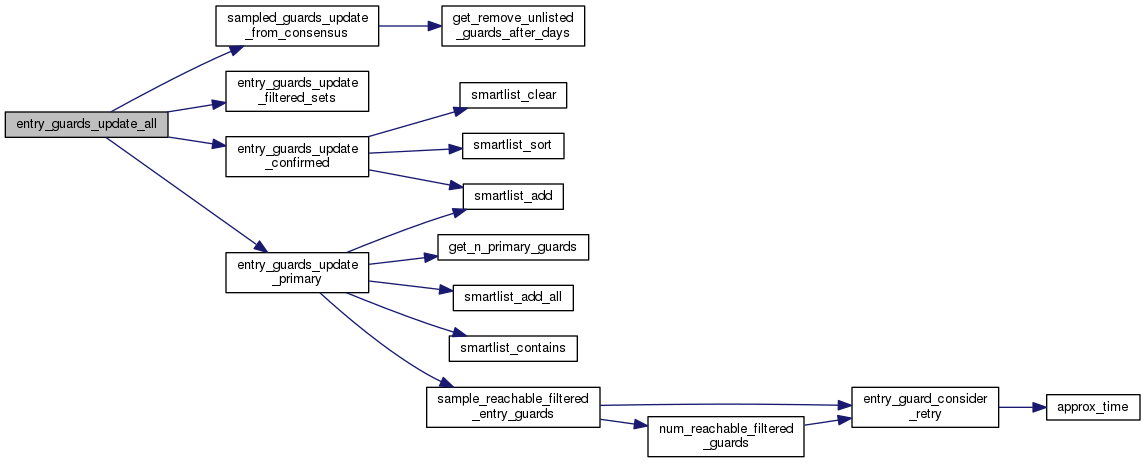
◆ entry_guards_update_state()
| void entry_guards_update_state | ( | or_state_t * | state | ) |
If the entry guard info has not changed, do nothing and return. Otherwise, free the EntryGuards piece of state and create a new one out of the global entry_guards list, and then mark state dirty so it will get saved to disk.
◆ entry_guards_upgrade_waiting_circuits()
| int entry_guards_upgrade_waiting_circuits | ( | guard_selection_t * | gs, |
| const smartlist_t * | all_circuits_in, | ||
| smartlist_t * | newly_complete_out | ||
| ) |
Look at all of the origin_circuit_t * objects in all_circuits_in, and see if any of them that were previously not ready to use for guard-related reasons are now ready to use. Place those circuits in newly_complete_out, and mark them COMPLETE.
Return 1 if we upgraded any circuits, and 0 otherwise.


◆ entry_list_is_constrained()
| int entry_list_is_constrained | ( | const or_options_t * | options | ) |
Return 0 if we're fine adding arbitrary routers out of the directory to our entry guard list, or return 1 if we have a list already and we must stick to it.

◆ get_guard_selection_info()
| guard_selection_t* get_guard_selection_info | ( | void | ) |
Get current default guard_selection_t, creating it if necessary
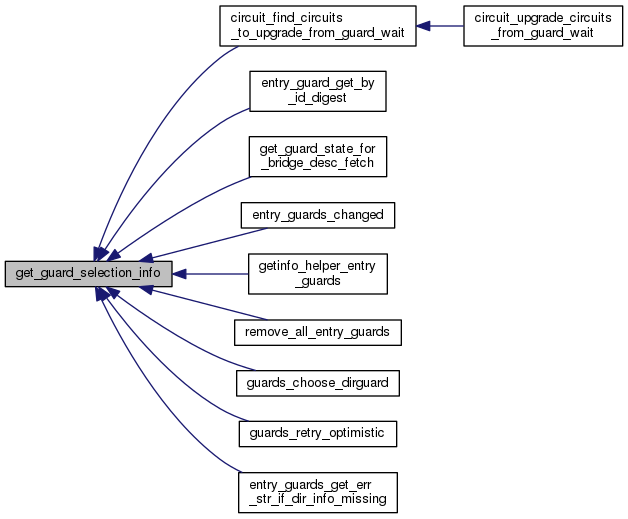
◆ get_guard_state_for_bridge_desc_fetch()
| circuit_guard_state_t* get_guard_state_for_bridge_desc_fetch | ( | const char * | digest | ) |
We are about to connect to bridge with identity digest to fetch its descriptor. Create a new guard state for this connection and return it.

◆ getinfo_helper_entry_guards()
| int getinfo_helper_entry_guards | ( | control_connection_t * | conn, |
| const char * | question, | ||
| char ** | answer, | ||
| const char ** | errmsg | ||
| ) |
If question is the string "entry-guards", then dump to *answer a newly allocated string describing all of the nodes in the global entry_guards list. See control-spec.txt for details. For backward compatibility, we also handle the string "helper-nodes".
XXX this should be totally redesigned after prop 271 too, and that's going to take some control spec work.
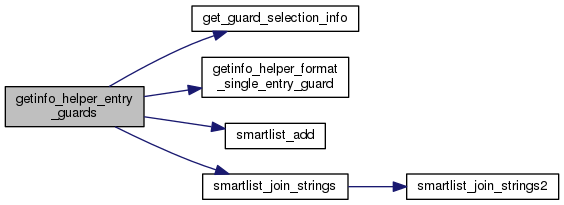
◆ guard_selection_get_err_str_if_dir_info_missing()
| char* guard_selection_get_err_str_if_dir_info_missing | ( | guard_selection_t * | gs, |
| int | using_mds, | ||
| int | num_present, | ||
| int | num_usable | ||
| ) |
Check if we are missing any crucial dirinfo for the guard subsystem to work. Return NULL if everything went well, otherwise return a newly allocated string with an informative error message. In the latter case, use the genreal descriptor information using_mds, num_present and num_usable to improve the error message.


◆ guards_choose_dirguard()
| const node_t* guards_choose_dirguard | ( | uint8_t | dir_purpose, |
| circuit_guard_state_t ** | guard_state_out | ||
| ) |
Helper: pick a directory guard, with whatever algorithm is used.

◆ guards_choose_guard()
| const node_t* guards_choose_guard | ( | cpath_build_state_t * | state, |
| uint8_t | purpose, | ||
| circuit_guard_state_t ** | guard_state_out | ||
| ) |
Helper: pick a guard for a circuit, with whatever algorithm is used.

◆ guards_retry_optimistic()
| int guards_retry_optimistic | ( | const or_options_t * | options | ) |
If we're running with a constrained guard set, then maybe mark our guards usable. Return 1 if we do; 0 if we don't.

◆ guards_update_all()
| int guards_update_all | ( | void | ) |
Helper: Update the status of all entry guards, in whatever algorithm is used. Return true if we should stop using all previously generated circuits, by calling circuit_mark_all_unused_circs() and circuit_mark_all_dirty_circs_as_unusable().


◆ pathbias_get_close_success_count()
| double pathbias_get_close_success_count | ( | entry_guard_t * | guard | ) |
Return the number of circuits counted as successfully closed for this guard.
Also add in the currently open circuits to give them the benefit of the doubt.

◆ pathbias_get_use_success_count()
| double pathbias_get_use_success_count | ( | entry_guard_t * | guard | ) |
Return the number of circuits counted as successfully used this guard.
Also add in the currently open circuits that we are attempting to use to give them the benefit of the doubt.

◆ remove_all_entry_guards()
| void remove_all_entry_guards | ( | void | ) |
Remove all currently listed entry guards, so new ones will be chosen.
XXXX This function shouldn't exist – it's meant to support the DROPGUARDS command, which is deprecated.

◆ remove_all_entry_guards_for_guard_selection()
| void remove_all_entry_guards_for_guard_selection | ( | guard_selection_t * | gs | ) |
Remove all currently listed entry guards for a given guard selection context. This frees and replaces gs, so don't use gs after calling this function.

◆ should_apply_guardfraction()
| int should_apply_guardfraction | ( | const networkstatus_t * | ns | ) |
Return 0 if we should apply guardfraction information found in the consensus. A specific consensus can be specified with the ns argument, if NULL the most recent one will be picked.

◆ update_guard_selection_choice()
| int update_guard_selection_choice | ( | const or_options_t * | options | ) |
Check whether we should switch from our current guard selection to a different one. If so, switch and return 1. Return 0 otherwise.
On a 1 return, the caller should mark all currently live circuits unusable for new streams, by calling circuit_mark_all_unused_circs() and circuit_mark_all_dirty_circs_as_unusable().

 1.8.13
1.8.13